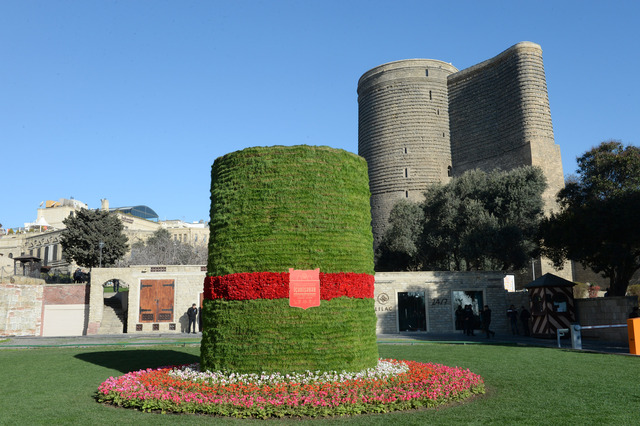Azerbaijan celebrates festive Novruz Bayram

By Nazrin Gadimova
Millions of people worldwide celebrate the arrival of spring with the festive Novruz Holiday.
Symbolizing the awakening of natural life and the victory of good over the evil forces of darkness, represented by the Winter, this holiday is the time when the cold Winter finally begins to retreat, giving way to the lively and hopeful Spring.
The ancient traditions say one must plant a tree on Novruz and not cut down a tree under any circumstances. People generally believe that planting a mulberry tree, fig tree, or chestnut tree is a good sign.
The most sacred Novruz ceremony is growing semeni, the green sprouting wheat, that symbolizes sowing and a rich harvest; it also represents grain, bread, and abundance. Grain and abundance is a pledge of life, existence, and the most vital material necessary for life.
People have always grown semeni from wheat, barley, peas, lentils or other grains in copper dishes; they have always revered it and rejoiced at its sprouting. The largest semeni in Azerbaijan are grown on top of the ancient Maiden Tower in Baku.
Celebrations begin a month before the holiday itself. The four Tuesdays before the main holiday are celebrated. They are named after elements and called Su Chershenbesi (Water Tuesday), Odlu Chershenbe (Fire Tuesday), Hava Chershenbesi (Wind Tuesday), and Ilakhir Chershenbe or Torpaq Chershenbesi (Earth or Last Tuesday).
People say "A good beginning makes a good ending". So, it is very important for Azerbaijanis to celebrate this festive holiday at a clean house and a richly-set table. The table must be set at least with seven dishes.
Azerbaijan, famous for its rich cuisine, has special dishes for each Tuesday. Pilaf is undoubtedly a signature dish of the Azerbaijani cuisine. There are about 200 kinds of pilaf, and each woman knows at least one recipe for this royal dish.
Novruz is a favorite holiday because every year the traditional sweets of the Azerbaijani cuisine such as pakhlava, shakarbura, shorgogal and badambura are cooked and served at the festive table. Also "govurgha" (toasted wheat) is mixed with nuts (mainly walnuts, hazelnuts, almonds and chestnuts) and placed on the table along with other sweets.
The required element of the festive table is khoncha, a big silver or copper tray with semeni placed in the center, and candles and dyed eggs for each family member around it. On this day, the groom gives his bride khoncha with sweets and golden and silver adornments. The bride's family also has to send gifts to groom's house.
The kids usually leave their hats on the verge of their neighbors' properties, and they, in turn, fill them with these sweets. This amusing custom, which is observed today, creates a festive atmosphere.
During Novruz, people are given their holiday 'portion' or Novruz payi. Holiday cakes, semeni and candles are put on a khoncha and sent to the neighbors and friends. It is good to give New Year presents not only to Azerbaijanis, but also to the representatives of other nations, so that they can enjoy the sweetness of Novruz as well. Other nationalities that live in Azerbaijan look forward to Novruz too.
An ancient Novruz tradition is to burn uzarlik (rue), which provides protection from the evil eye and negative energy. Its smoke is wafted over the children, house, cattle, and pets. It is traditionally believe that at the moment the New Year's day arrives, you should go into the yard or stand at an open window and make a wish.
Another Novruz ritual related to economy and stock-rearing is to tie a red ribbon, usually reserved for weddings, around the horns of bulls, cows, and sheep. It is forbidden to kill horses, dogs, and even snakes on this holiday.
It is traditional to light bonfires on all the four Tuesdays and the eve of Novruz, and jump seven times over one bonfire, or once over 7 bonfires despite one's age and gender. People believe that fire is purifying and takes away all your troubles before the start of the New Year [solar calendar]. Young boys and girls take the ashes of the fire and throw it far from their houses, meaning that they're throwing away all the misfortunes of their family with the ashes.
The number of weddings increases during Novruz. People believe that families formed during Novruz will be happy ones. Boys born during the holiday season are often called Novruz, while girls are called Bahar, which means 'spring'.
Azerbaijanis love Novruz for its democratic philosophy, because it is not just a holiday that marks the vernal equinox; it is a holiday that marks people's equality. Bringing together different sections of the population, Novruz strengthens mutual esteem, mutual understanding, and social cohesion.
Happy Holidays!
Here we are to serve you with news right now. It does not cost much, but worth your attention.
Choose to support open, independent, quality journalism and subscribe on a monthly basis.
By subscribing to our online newspaper, you can have full digital access to all news, analysis, and much more.
You can also follow AzerNEWS on Twitter @AzerNewsAz or Facebook @AzerNewsNewspaper
Thank you!
